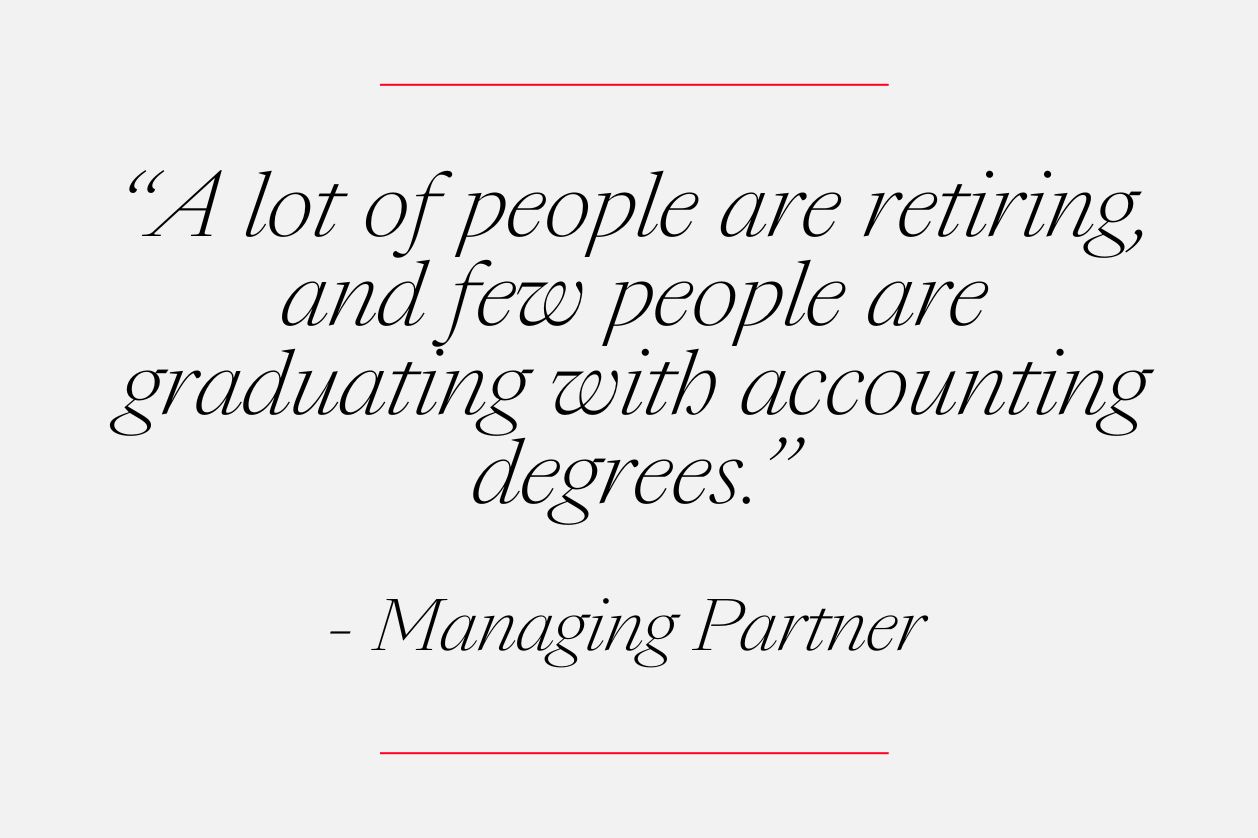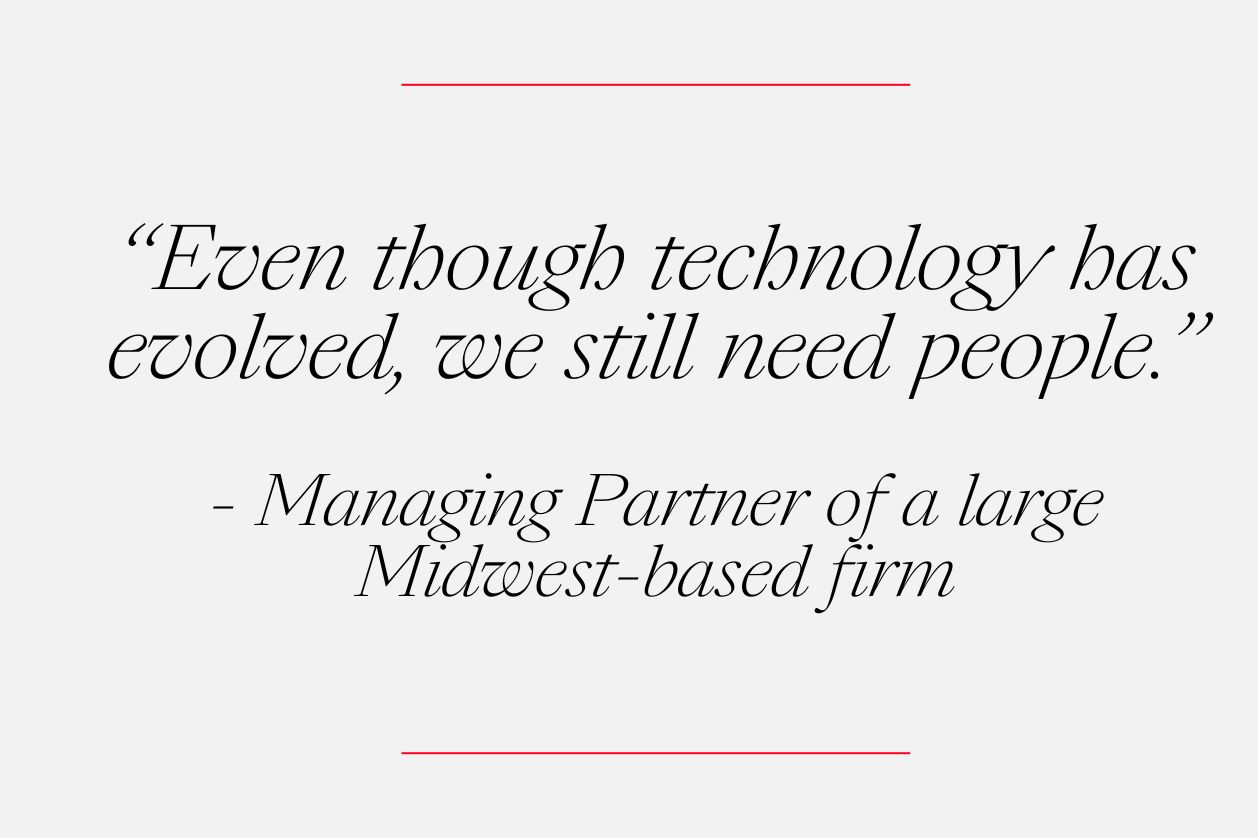2023 Accounting Firm Industry Insider Series: Key Takeaways from In-Depth Conversations with Managing Partners (Part 2)

The accounting industry is in a state of transition. The pandemic, remote/hybrid work, and the influx of private equity have all impacted accounting firms to varying degrees.
To better understand the landscape of the accounting industry – current and the anticipated future – I have been interviewing managing partners and industry insiders regularly for the past three years.
I recently spoke in depth with managing partners, CEOs, and other leaders at a range of accounting firms – from small- and mid-sized firms to Top 10 firms – for insight on the leading issues facing the industry. While interviewees may have different viewpoints on certain topics, the general mood reflected the industry’s strong performance combined with an awareness that changes are afoot.
In part one I shared insights on the impact of private equity and the industry’s evolving business models. In this second article of a two-part series, I’ll share key takeaways from these comprehensive conversations regarding talent and outsourcing, their financial impact on firms, and what is on the horizon for the industry.
The “war for talent” is calming down, but labor challenges remain for some firms.
Interviewees at firms of all sizes acknowledged that the labor market is a little less challenging than in the past few years, but many expressed concerns about the long-term health of the industry’s talent pipeline because fewer people are entering the industry.
“A lot of people are retiring, and few people are graduating with accounting degrees,” worried one managing partner.
The CEO at one of the nation’s largest firms noted that the current training and education requirements for those entering the accounting field aren’t supported by the salaries earned at the starting level. In addition to encouraging the industry to raise starting salaries, he hopes that technology and outsourcing will enable people to spend more time on work they find meaningful.

A handful of interviewees – from small firms to Top 50 firms – said that a remote/hybrid work environment has created challenges with mentorship, training, and retention, but most interviewees acknowledged that the hybrid workplace is likely here to stay. One of the largest firms I spoke with said that they are benefitting from some firms’ unwillingness to adapt as talented professionals at firms with stricter return-to-office requirements seek them out for employment.
Several interviewees, including managing partners at mid-size firms and some of the largest firms, emphasized that technology has alleviated some of the intense hiring pressures, but it won’t eliminate the need for people. Instead, technology will change how firms utilize their talent by minimizing mundane tasks and creating the ability to offer higher value services.
Utilizing global resources is an important and growing component of accounting firms’ business model – but the scope varies.
Across the board, accounting firms continue to rely on workers outside of the U.S. to provide some of their services. While small- and mid-sized firms outsource this work through third-party providers, larger firms rely on in-house CPAs located overseas to meet their labor needs. In either scenario, the majority of the work is done in India.
For one firm, its heavy investment in technology hasn’t been enough to alleviate the talent shortage. Although the firm is automating tasks like lease abstractions and audit work, the need for talent in advisory services continues. Most firms said their target is to offshore 25-30% of work though they haven’t achieved this level yet; interviewees are currently sending about 2-20% of work overseas.
Talent and labor challenges are impacting profits.
Following a year or two of extraordinary profits throughout the industry, most interviewees said this year’s profits are relatively flat even though revenue is up.
Higher expenses – mostly labor expenses – are the primary contributor to this year’s flat margins. However, because profits have been so high in recent years, profits have leveled off at a high amount.
What’s in store for the industry? More reliance on global resources and more advisory services.
Time will tell the extent to which private equity has shaken up the accounting industry, but traditional firms (i.e., those not owned by private equity) will likely need to prioritize investments in the business over partner compensation.
We may see a bump in salaries at the junior level, as some leaders advocated, and we are likely to see an increased emphasis on advisory/consulting services as routine tasks are offshored or technology solutions are deployed. Almost all managing partners expressed plans to increase their advisory services.
“We need to upskill people to be more advisory,” said the managing partner of a large Midwest-based firm. “Even though technology has evolved, we still need people.”
Special thanks to the managing partners, CEOs, and COOs who shared their opinions, experience, and insights with me.
